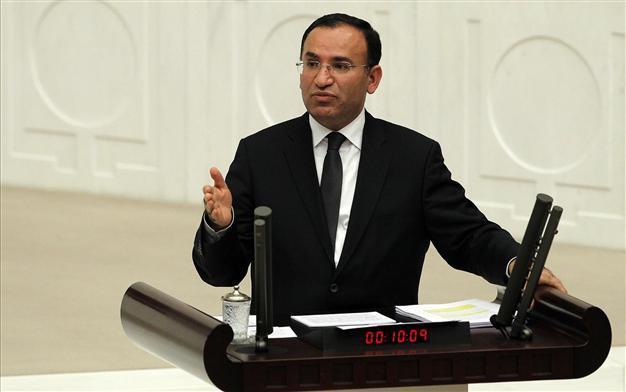Turkish justice minister sees 'plot' behind debate on electoral threshold
ANKARA

Justice Minister Bekir Bozdağ.
Justice Minister Bekir Bozdağ has torn into the Constitutional Court for its decision to consider lifting the infamous 10 percent election threshold for legislative representation, dubbing the Court’s move an “open intervention into the 2015 elections.”
Bozdağ, speaking in an interview on Dec. 4, underlined that any implementation of a probable decision by the Constitutional Court would solely be up to the Supreme Election Board (YSK), while noting his conviction that such a decision should not be implemented in the run-up to the June 2015 parliamentary elections.
The appeal concerning the matter was filed in June 2014 and the issue came onto the agenda in late November after the election process had de facto begun, Bozdağ told the private Kanal 24 news channel.
“There is only six months left until the election; what is the use of launching a debate on elections within six months? I think about it; is there some ‘engineering’ aimed for the 2015 election? But the courts must not engage in engineering targeting the elections and must not regulate politics,” he said.
“When the Constitutional Court takes a step that would have an impact on the formation of the Parliament in Turkey and on people’s choices in the run-up to the 2015 elections, it means that political engineering is coming into play through the Court,” Bozdağ added.
Meanwhile, Deputy Prime Minister Numan Kurtulmuş similarly suggested that the Constitutional Court’s review was “meaningful in terms of timing."
Speaking in an interview with private NTV news channel late Dec. 3, Kurtulmuş argued that the Court should not have the authority to “control the legislative body” and instead should simply review whether laws are constitutional or not.
In Istanbul, speaking at a press conference, Turkish Industry and Business Association (TÜSİAD) President Haluk Dinçer said his group had previously stated that the 10 percent threshold was "not fair" for a democratic system.
Both ruling and opposition parties should come together to lower the threshold for the sake of fair representation, Dinçer said.
“Since we have all along stated that this threshold should be decreased, the way it is decreased does not matter for us – whether it is decreased through a legal ruling or through a decision by the politicians,” he added.
Bozdağ, however, made an analogy between a 2007 ruling by the top court and today’s debate.
“In the past, the Constitutional Court made ‘the 367’ decision, but did it raise its prestige?” he said, adding that that those who issued that ruling were "still embarrassed" by the decision. At the time, in a chain of events that plunged Turkey into political turmoil and forced early elections, hours after Parliament held an inconclusive first-round vote to elect a new president - with former President Abdullah Gül standing as the sole candidate - an “e-memorandum” was posted on the military’s website at midnight on April 27, 2007. In the statement, the army threatened to directly intervene to "protect Turkey’s secular system."
Several days later, the Constitutional Court ruled that Parliament needed a super-majority quorum of 367 lawmakers to vote for a president. Parliament failed to reach the quorum in subsequent sessions as opposition deputies shunned the vote, effectively blocking the election. The ruling Justice and Development Party (AKP) responded by calling early elections, which it won comfortably, and the new Parliament elected Gül in August that year.
